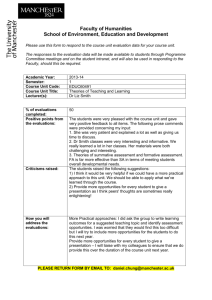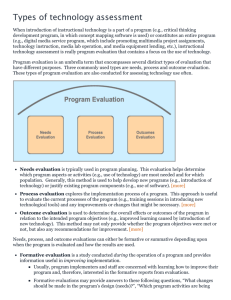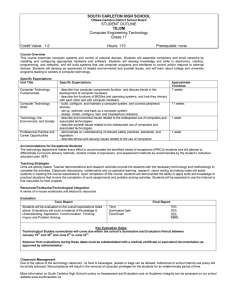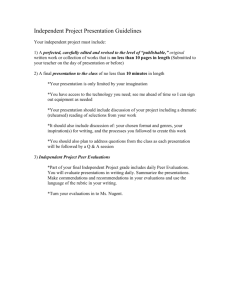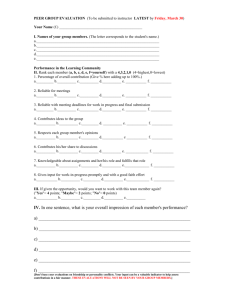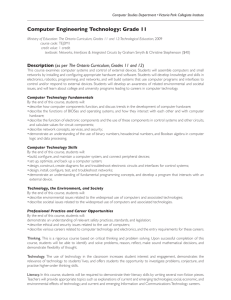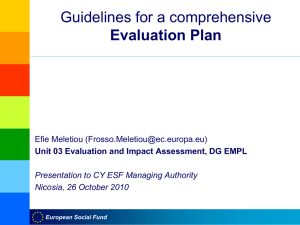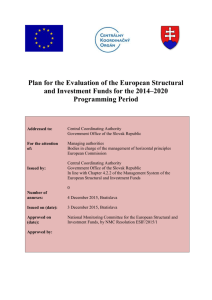CHW3M1 – World History to 1600
advertisement
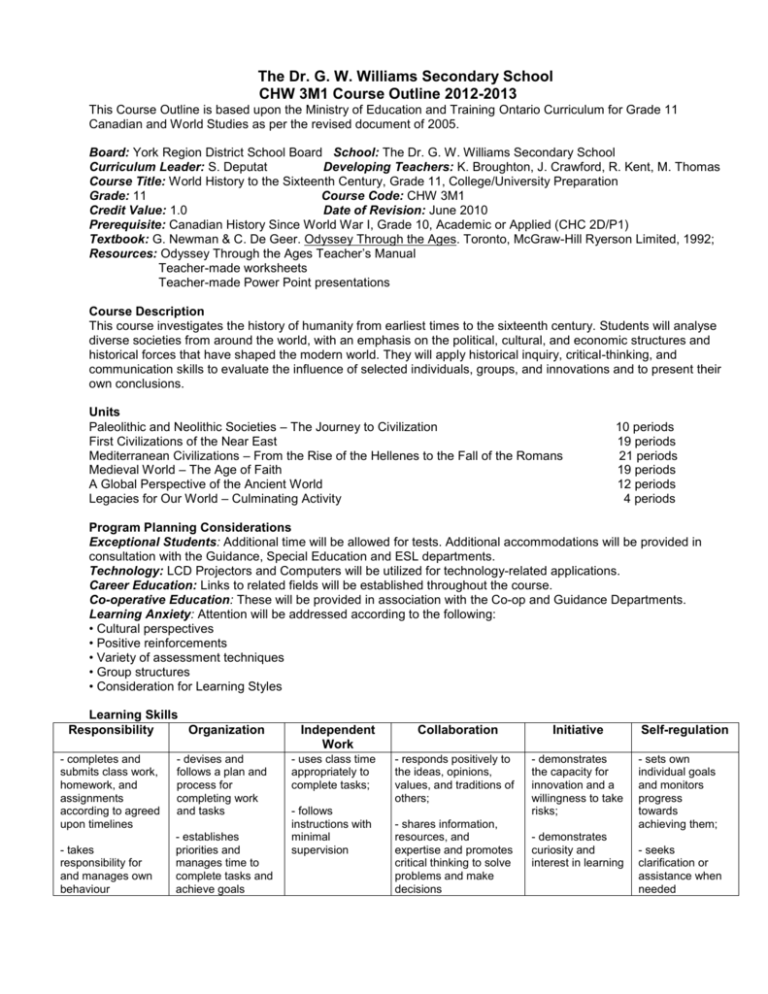
The Dr. G. W. Williams Secondary School CHW 3M1 Course Outline 2012-2013 This Course Outline is based upon the Ministry of Education and Training Ontario Curriculum for Grade 11 Canadian and World Studies as per the revised document of 2005. Board: York Region District School Board School: The Dr. G. W. Williams Secondary School Curriculum Leader: S. Deputat Developing Teachers: K. Broughton, J. Crawford, R. Kent, M. Thomas Course Title: World History to the Sixteenth Century, Grade 11, College/University Preparation Grade: 11 Course Code: CHW 3M1 Credit Value: 1.0 Date of Revision: June 2010 Prerequisite: Canadian History Since World War I, Grade 10, Academic or Applied (CHC 2D/P1) Textbook: G. Newman & C. De Geer. Odyssey Through the Ages. Toronto, McGraw-Hill Ryerson Limited, 1992; Resources: Odyssey Through the Ages Teacher’s Manual Teacher-made worksheets Teacher-made Power Point presentations Course Description This course investigates the history of humanity from earliest times to the sixteenth century. Students will analyse diverse societies from around the world, with an emphasis on the political, cultural, and economic structures and historical forces that have shaped the modern world. They will apply historical inquiry, critical-thinking, and communication skills to evaluate the influence of selected individuals, groups, and innovations and to present their own conclusions. Units Paleolithic and Neolithic Societies – The Journey to Civilization First Civilizations of the Near East Mediterranean Civilizations – From the Rise of the Hellenes to the Fall of the Romans Medieval World – The Age of Faith A Global Perspective of the Ancient World Legacies for Our World – Culminating Activity 10 periods 19 periods 21 periods 19 periods 12 periods 4 periods Program Planning Considerations Exceptional Students: Additional time will be allowed for tests. Additional accommodations will be provided in consultation with the Guidance, Special Education and ESL departments. Technology: LCD Projectors and Computers will be utilized for technology-related applications. Career Education: Links to related fields will be established throughout the course. Co-operative Education: These will be provided in association with the Co-op and Guidance Departments. Learning Anxiety: Attention will be addressed according to the following: • Cultural perspectives • Positive reinforcements • Variety of assessment techniques • Group structures • Consideration for Learning Styles Learning Skills Responsibility Organization - completes and submits class work, homework, and assignments according to agreed upon timelines - takes responsibility for and manages own behaviour - devises and follows a plan and process for completing work and tasks - establishes priorities and manages time to complete tasks and achieve goals Independent Work - uses class time appropriately to complete tasks; - follows instructions with minimal supervision Collaboration - responds positively to the ideas, opinions, values, and traditions of others; - shares information, resources, and expertise and promotes critical thinking to solve problems and make decisions Initiative - demonstrates the capacity for innovation and a willingness to take risks; - demonstrates curiosity and interest in learning Self-regulation - sets own individual goals and monitors progress towards achieving them; - seeks clarification or assistance when needed Assessment Strategies A variety of teaching/assessment strategies to address students’ needs will be used during the school year. Formative assessments will be ongoing through out the academic year. These may include: • Diagnostic assessment • Formative assessment • Performance assessment • Portfolio type assessment • Rubrics Term Summative Evaluations (70% Term Work) • Tests, quizzes, performance tasks and other forms of summative evaluations will occur throughout the academic year at the end of units of work as outlined in the accompanying course outline. • Students will be provided with reasonable opportunities to master skills relating to the achievement of the curriculum expectations before assessment and evaluation occurs. • Major evaluations will be announced at least one week in advance. • Accommodations will be made for school activities, statutory holidays, religious days, cultural days, sports events and other occurrences that may impact on any scheduled evaluation. It is the student’s responsibility to notify teachers of such absences in advance and to make up missed work. • Absence on the day of an evaluation must be documented. If a student must miss an evaluation, s/he is expected to: a) see the teacher before the absence to arrange for an alternative date to make up the evaluation; or b) in case of illness or unexpected absence, present a note to the teacher, signed by a parent or guardian, immediately upon their return to explain the absence. An alternate evaluation will then be scheduled at a mutually convenient time. • The Dr. G. W. Williams Late Policy applies to all assignments and evaluations. See your Agenda. • Cheating and plagiarism will not be tolerated in any form and will be dealt with appropriately. Final Mark Calculation Calculation of the Term Mark will be based upon the Categories of the Achievement Chart. This chart is meant to assist teachers in planning instruction and learning activities for the achievement of the curriculum expectations. It is also used in designing assessment and evaluation tools and in providing feedback to students. Each unit will contain each category in the chart due to the integrated nature of the study of history. Final marks will be calculated as follows: Term Work: (70% of course mark) Knowledge and Understanding: 17.5% Application: 17.5% Thinking: 17.5% Communication: 17.5% Final Summative Evaluations: (30% of course mark) Course Culminating Activity (CCA) 10% Final Examination 20% Reporting Interim Report 100% Term Work Midterm Report 100% Term Work (Cumulative) Levels of Achievement: Level 1: 50 - 59% Level 2: 60 – 69% Level 3: 70 – 79% Level 4: 80 - 100% Final Report 70% Term Work (Cumulative) + 10% CCA + 20% Exam Communication Access to extra help and mark records. Students are encouraged to consult their teachers on a regular basis for extra help and guidance as it relates to improving their academic performance. Students are also expected to discuss strategies for improving their grades with their teachers. Students are expected to view their report cards as an indication of their current achievement and discuss with teachers for clarification. Communication with Parents/Guardians. Comments pertaining to academic achievement and learning skills are placed on the report cards are primarily to provide feedback for parents/guardians as well as students. Parent/guardian nights can be used for one to one discussion. At times it may be necessary to contact parents/guardians by email, telephone, or written letter to discuss a student’s performance. Parents/guardians are also encouraged to contact teachers as and when the need arises.
